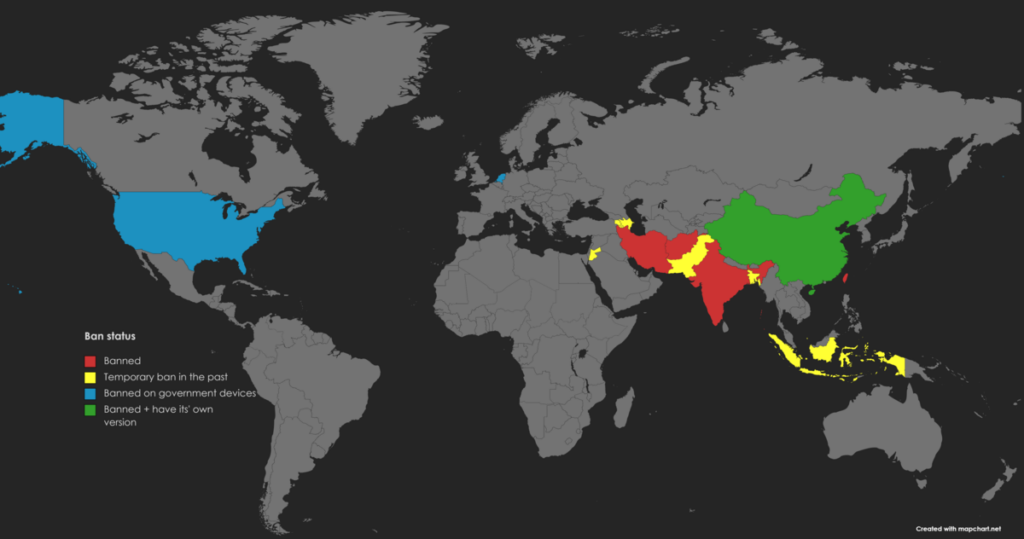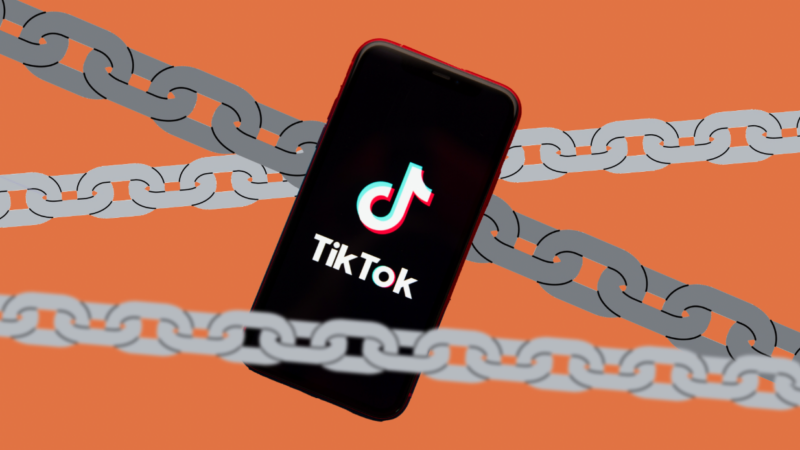TikTok is under significant regulatory pressure again. The U.S. Senate’s recent move could force TikTok’s parent company, ByteDance, to sell the app by January 2025 to prevent a nationwide ban. In reaction, TikTok has sued, claiming this violates First Amendment rights, while billionaire Frank McCourt considers buying the app to keep it operational in the U.S.
This scrutiny isn’t confined to the U.S.; over 30 countries have imposed bans or restrictions in the past due to concerns over data privacy and national security. Such governmental controls threaten to curb digital freedom and economic opportunities for content creators and small businesses reliant on TikTok for income.
We’ll keep monitoring these developments and suggest alternatives for users impacted by these restrictions.
Regions with TikTok regulations or potential future restrictions as of 2025

Since its launch, TikTok has quickly become a global phenomenon, reaching over two billion users with its catchy videos and creative features. However, its massive popularity and extensive data collection have raised eyebrows worldwide, leading to various regulatory actions by different countries.
As of 2025, here’s a roundup of where TikTok has faced regulations:
Africa:
- Senegal: TikTok faced a complete ban starting in August 2023.
- Somalia: A ban was announced in August 2023, but it hasn’t been enforced yet.
- Kenya: A petition for a ban was filed citing unregulated content, though no action had been taken by the government.
Asia:
- Afghanistan and Iran 🇮🇷 are among the countries where TikTok was completely banned.
- India: After a temporary ban in 2019, TikTok was permanently banned in June 2020.
- China: TikTok doesn’t operate here; instead, its local version Douyin is available.
- Hong Kong: TikTok withdrew voluntarily in July 2020.
Europe:
- Austria, Belgium, Denmark, and several other European countries imposed bans on TikTok on government work devices by 2023.
- Russia: Restricted the app to only show content from Russian creators.
North America:
- Canada and United States: Both countries banned TikTok on government-issued devices, with additional bans at provincial, state, and university levels in Canada.
Oceana:
- Australia: Banned TikTok on federal government-owned devices as of April 2023.
- New Zealand: Restricted TikTok use on devices connected to Parliament since March 2023.
This regulatory landscape shows a clear global concern over the implications of TikTok’s data practices and content moderation.
Countries where TikTok is completely banned

India:
India was one of the first large markets to take a firm stance against TikTok, citing data privacy and national security concerns. The ban reflects ongoing tensions between India and Chinese tech companies, significantly impacting the app’s global user base.
United States:
In the U.S., TikTok has faced scrutiny at both the federal and state levels, primarily due to fears over data security. Several institutions and states have implemented bans, and there are ongoing debates about the app’s safety and privacy policies.
Australia:
Australia’s decision to ban TikTok on federal government devices aligns with its tightening cybersecurity protocols. The move highlights growing global concerns about the security of information handled by apps with ties to foreign entities.
Canada:
Canada followed its southern neighbor in restricting TikTok’s use on government devices. The bans reflect broader efforts to safeguard sensitive information from potential foreign interference.
China:
In China, TikTok operates as Douyin, its local counterpart, tailored specifically to comply with Chinese censorship and data laws. This distinction underscores the varying operational strategies of tech companies within and outside China.
Russia:
Russia’s unique approach to TikTok regulation limits users to viewing content only from Russian creators. This policy is part of broader efforts to control online content and maintain cultural sovereignty.
United Kingdom:
The UK has imposed bans on TikTok on government devices, citing security risks. This precautionary measure reflects increasing vigilance regarding the security of government communications and data.
Belgium:
Belgium has taken a cautious approach by banning TikTok on government work devices due to concerns about national security. This move is part of a wider trend of European nations assessing the risks associated with foreign tech platforms.
New Zealand:
New Zealand’s targeted restriction of TikTok on parliamentary devices signifies its strategic approach to safeguarding the nation’s political and operational infrastructures from potential cyber threats.
Afghanistan:
Afghanistan’s outright ban on TikTok is influenced by the regime’s stance on media and internet control, reflecting broader efforts to regulate online spaces in alignment with its governance policies.
See Also: How to bypass Tiktok ban with a VPN
Countries Considering TikTok Bans
As regulations tighten on TikTok, two African nations are eyeing potential bans due to concerns over the platform’s impact and risks.
USA In the USA, the government has been contemplating significant measures against TikTok, citing national security concerns due to the app’s Chinese ownership. This has led to proposals for restrictive legislation and potential bans in certain sectors, especially on devices used by government employees.
Somalia In August 2023, Somalia proposed banning TikTok, Telegram, and the betting site 1XBet, driven by worries about harmful content distribution. The government is still deciding whether to proceed with these bans.
Kenya In April 2024, a Kenyan parliamentary petition called for banning TikTok, citing violence, hate speech, and offensive content. However, instead of a full ban, the Information and Communication Ministry recommended a co-regulation approach. This would require TikTok to filter its content according to local laws and submit moderation reports quarterly. The proposal is currently under review.
Why are Countries cracking down on TikTok?
TikTok is facing bans and restrictions across the globe, mainly due to worries about data security, privacy, and national security. A lot of these concerns stem from the fact that TikTok is owned by ByteDance, a Chinese company.
Given China’s laws that compel companies to hand over data to the government when asked, many countries are on edge. There’s also a fear that TikTok could become a backdoor for foreign governments to access sensitive information, especially if used on government devices or by individuals in key positions.
Beyond data risks, some nations are also troubled by the content on TikTok, ranging from explicit material to misinformation, leading them to push for bans or tighter controls.
How to get around these TikTok Bans?
If you’re concerned about losing access to TikTok due to impending bans, there are a few things that you must know about to keep using the app.
First, consider downloading TikTok before the cutoff on January 19, 2025. This allows you to continue accessing the app on your current device, although you won’t receive new updates, which might eventually affect app performance and security.
Another approach is to change your app store location. If your app store is set to a country where TikTok remains available, you can bypass download and update restrictions. This method requires a payment method valid in the new country and may lead to losing access to some previously downloaded apps and content.
The simplest solution might be accessing TikTok through a browser using a Tiktok VPN. By connecting to a VPN server in a country where TikTok isn’t banned, such as with PureVPN, you can obtain an IP address from that country and circumvent any ISP blocks in the U.S.





